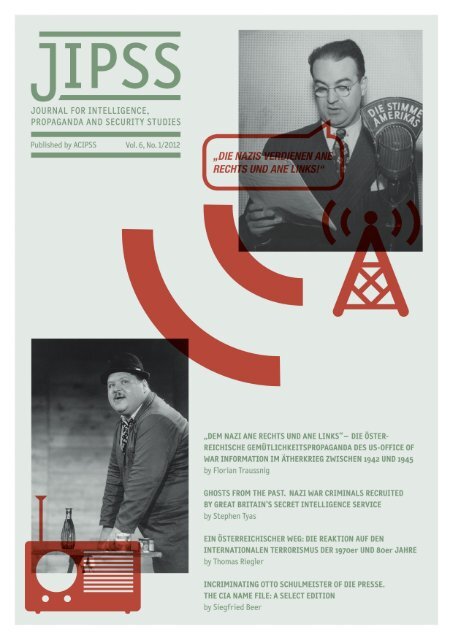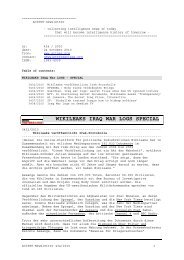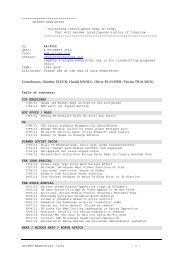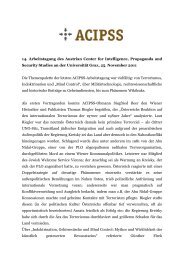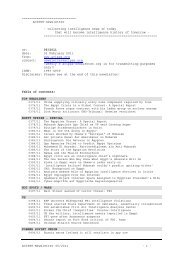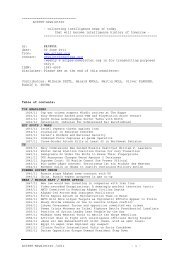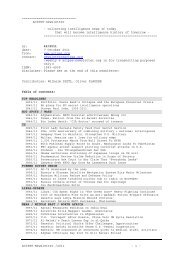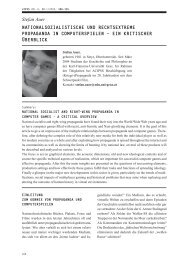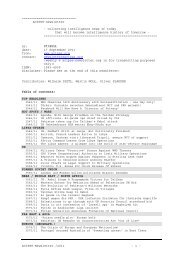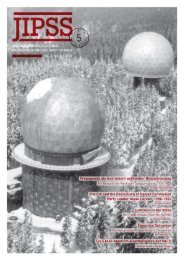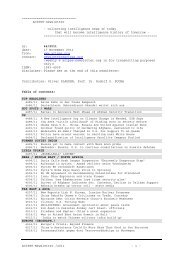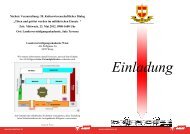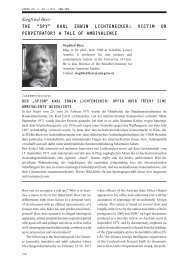Volume 6, No. 1/2012 - acipss
Volume 6, No. 1/2012 - acipss
Volume 6, No. 1/2012 - acipss
You also want an ePaper? Increase the reach of your titles
YUMPU automatically turns print PDFs into web optimized ePapers that Google loves.
VOLUME 6, NUMBER 1 / <strong>2012</strong><br />
Published by the<br />
Austrian Center for Intelligence,<br />
Propaganda and Security Studies
JIPSS VOL.6, NR.1/<strong>2012</strong><br />
inHalt/contEnts<br />
2<br />
5<br />
7<br />
21<br />
48<br />
62<br />
80<br />
95<br />
118<br />
139<br />
158<br />
167<br />
179<br />
208<br />
209<br />
211<br />
214<br />
216<br />
218<br />
221<br />
223<br />
226<br />
228<br />
229<br />
231<br />
232<br />
234<br />
236<br />
238<br />
Editorial: siEgfriEd bEEr, Transitioning to more citizen security – ACIPSS a willing partner<br />
Topical Essays<br />
Hans scHafranEk, Das „Anti-Hitler-Komitee“ und die Fallschirmagenten-Gruppe um Gregor Kersche<br />
WinfriEd MEyEr, Sein oder Nichtsein: Der Wiener Jude Dr. Johann Koessler als V-Mann „Kolberg“<br />
des deutschen und Doppelagent „Hamlet“ des britischen Nachrichtendienstes<br />
MatEja ČoH, Illegal Groups in Slovenia after World War II: Resistance against the Rule of the Yugoslav<br />
Communist Party<br />
stEpHEn tyas, Ghosts from the Past. Nazi War Criminals Recruited by Great Britain’s Secret Intelligence Service<br />
pEtEr HaMMErscHMidt, „With the Backing of the BND“. Die Waffendeals des westdeutschen<br />
Auslandsnachrichtendienstes mit lateinamerikanischen Militärdiktaturen. Das Beispiel „MEREX“<br />
florian traussnig, „Dem Nazi ane rechts und ane links“ – Die österreichische<br />
Gemütlichkeitspropaganda des US-Office of War Information im Ätherkrieg zwischen 1942 und 1945<br />
Martin finkEnbErgEr, Johann von Leers (1902-1965): NS-Propagandist und „internationaler“<br />
Antisemit. Biografische Korrekturen<br />
tHoMas riEglEr, Ein österreichischer Weg: Die Reaktion auf den internationalen Terrorismus der<br />
1970er und 80er Jahre<br />
güntHEr flEck, Indoktrination, Gehirnwäsche und Mind Control: Mythos und Wirklichkeit des<br />
künstlich gesteuerten Bewusstseins<br />
pEtr klinovský, Jaroslav Kamarád: Leben und Abenteuer eines fliegenden Gendarmen<br />
Documentation<br />
siEgfriEd bEEr, Incriminating Otto Schulmeister of Die Presse. The CIA Name File: A Select Edition<br />
Book & Film Reviews<br />
Wolfgang Krieger, Geschichte der Geheimdienste (Paul Schliefsteiner)<br />
H. Keith Melton, Robert Wallace, Das einzig wahre Handbuch für Agenten (Peter Schintler)<br />
Ute Maucher, Gabi Pfeiffer, Codewort: Seidenstrumpf (Bodo Hechelhammer)<br />
Adam Riches, When The Comics Went To War. Comic Book War Heroes (Stefan Auer)<br />
Douglas Ford, The Elusive Enemy (Martin Moll)<br />
Ine van Linthout, Das Buch in der nationalsozialistischen Propagandapolitik (Martin Moll)<br />
Henrik O. Lunde, Finland’s War of Choice (Duncan Bare)<br />
Heinz Schneppen, Walther Rauff. Organisator der Gaswagenmorde (Werner Augustinovic)<br />
Thomas Fingar, Reducing Uncertainty. Intelligence Analysis and National Security (Johanna Fürst)<br />
T.V. Paul, The Tradition of <strong>No</strong>n-Use of Nuclear Weapons (Daniela Peterka-Benton)<br />
Philipp Hauenstein, Lukas Hegi (eds.), Private Militär- und Sicherheitsfirmen (Robert D. Billinger, Jr.)<br />
Alexandra, Baker, Caparini (eds.), Private Military and Security Companies (David Christopher Jaklin)<br />
Camp Armadillo (David Christopher Jaklin)<br />
War on Terror (Reinmar Nindler)<br />
Tinker, Tailor, Soldier, Spy (Gaj Trifkovic)<br />
Situation Report<br />
Chronik 1/<strong>2012</strong> von vErEna klug
Siegfried Beer<br />
Editorial<br />
transitioning to MorE citiZEn sEcurity –<br />
<strong>acipss</strong> a Willing partnEr<br />
“An open eye and ear might be more powerful than<br />
an iron fist”<br />
(a possible motto for a potential Graz-securityinitiative)<br />
JIPSS is proudly entering its sixth year of publication.<br />
We have tried to produce an internationally<br />
oriented journal on three crucial areas of modern<br />
life: on intelligence as everybody’s need to know;<br />
on ever-present propaganda as potential strategy to<br />
misdirect the recipient’s life; and on security as a<br />
human right in a functioning democracy, while at the<br />
same time offering a national focus in our contents<br />
as well. ACIPSS has now passed the eight-year point<br />
and has consistently aimed at the local scene, at Graz<br />
University through teaching, training and research,<br />
but also at intelligence and security concerns of the<br />
City of Graz, Austria’s second-largest.<br />
Our 15th ACIPSS Workshop on April 27, <strong>2012</strong><br />
was a case in point. Its title was: “Public Safety – Is<br />
there a (Need for) Citizen Responsibility?” It was<br />
a well-attended event to which politicians of all six<br />
political parties represented in the Graz City Council<br />
(Gemeinderat) were invited, as well as one of<br />
the highest local police officers. A report about this<br />
dialogue forum was duly published on our webpage<br />
(www.<strong>acipss</strong>.org). There was an almost complete<br />
consensus among all discussants that security issues<br />
belong to the most vital concerns of any community<br />
and that there is a great need to strengthen the aware-<br />
Siegfried Beer,<br />
Mag. et Dr. phil., born 1948 in Scheibbs, Lower<br />
Austria, is professor for late modern and<br />
contemporary history at the University of Graz.<br />
He is also Director of the Botstiber Institute for<br />
Austrian-American Studies.<br />
Contact: siegfried.beer@uni-graz.at<br />
jipss VOL.6, NR.1/<strong>2012</strong>, 5-6<br />
ness of citizens for the growing importance of citizen<br />
involvement and contribution in terms of individual<br />
and collective alertness and willingness to support<br />
security organizations in their increasingly difficult<br />
and diversified work. It was generally realized that<br />
the resources of all governments – federal, provincial<br />
or municipal – are finite and that authorities in<br />
charge of security cannot be omnipresent (police) or<br />
omniscient (intelligence), while ignorance, apathy,<br />
denial and complacency displayed by citizens can be<br />
dangerous, even deadly. Several participants lamented<br />
a glaring lack of civil(ian) caring and courage<br />
for even simply reporting the witnessing of crime<br />
and violence, despite the wide-spread possession<br />
of mobile phones by the majority of city-dwellers.<br />
This problem had also been recognised by former<br />
Austrian Interior Minister Maria Fekter when she<br />
stated: “Echte Helden holen Hilfe. Außerdem will ich<br />
mehr Bürgerbeteiligung an der Sicherheit.” 1 It also<br />
became quite clear that the spectrum of security to be<br />
considered at each and every level of society (from<br />
local to international/global) ranged from petty crime<br />
and violence to a potential terrorist activity (“What<br />
happened in Toulouse can happen in Graz also”).<br />
While there was general agreement on the importance<br />
(great), nature (complex) and massiveness<br />
(“Austria is no Island of the Blessed”) of the security<br />
problem at all levels, it was also recognised that<br />
security politics was difficult to sustain, that there<br />
was little media interest for it (not a single journalist<br />
3
BEER, Editorial<br />
attended the event) and that there were no proven<br />
channels of reaching the individual citizen on these<br />
issues. Then the idea of perhaps establishing a local<br />
security advisory council (Sicherheitsbeirat) on the<br />
model of the human rights advisory council (Menschenrechtsbeirat)<br />
was ventilated and found much<br />
spontaneous support. Such a council, it was hoped,<br />
could help keep such issues on the front burner.<br />
Needless to stress, ACIPSS is willing to participate<br />
in such a scheme and in this context can<br />
already point to a consistent policy of calling for an<br />
improved information management and a heightened<br />
citizen participation in the areas of intelligence and<br />
security in the editorials of its hitherto ten issues of<br />
JIPSS. Already in our initial number we exhorted:<br />
“We perceive a definite need to involve the interested<br />
citizen. JIPSS wants to contribute in this important<br />
area of democratic life.” 2 In the editorial of issue<br />
1/2008 we argued “The Case for Citizen Vigilance”<br />
by claiming: “It simply matters to which degree<br />
information is shared with all participants in civil<br />
society. […] This concern has led to the concept<br />
EndnotEs<br />
4<br />
of the ‘citizen intelligence minuteman’ as a kind of<br />
‘knowledge volunteer’, […] eventually leading to a<br />
security-smarter society.” 3 In the following number<br />
we admonished that “a key element in civil protection<br />
planning is deemed to be not only government activities<br />
at [all levels] but also the active involvement of<br />
all sections of society, i.e. of the individual citizen.<br />
This necessitates a widely-applied communication<br />
strategy.” 4 And again in 2011 we demanded that “it<br />
is time to recognise also in this country that citizen<br />
involvement in fighting crime and terror is a strategy<br />
well worth pursuing in order to enhance safety<br />
in neighbourhoods and to improve security at any<br />
level of society.” 5<br />
ACIPSS has been built on the conviction that<br />
the sciences, even the humanities, have to look for<br />
application and connection to society at large. 6 If the<br />
City of Graz is ready to become serious in the promotion<br />
of personal security as a citizen right as much<br />
as a citizen responsibility in a given community and<br />
society, we will gladly offer our accumulated scientific<br />
expertise and future endeavour in partnership.<br />
1 Heroes fetch help. Besides, I want more participation of citizens in the area of security. As reported in the Viennese daily Österreich,<br />
30 December 2010.<br />
2 Journal for Intelligence, Propaganda and Security Studies Vol. 1, Nr. 1 (2007), 5.<br />
3 Ibid., Vol. 2, Nr. 1 (2008), 6.<br />
4 Ibid., Vol. 2, Nr. 2 (2008), 6.<br />
5 Ibid., Vol. 5, Nr. 2 (2011), 7.<br />
6 As stated in the editorial of the initial issue of our journal: „[JIPSS] will particularly aim to bridge the gap between the academic<br />
fields of scientific production and a general non-academically oriented audience.” Cf. Siegfried Beer, Why Another Journal?<br />
Thoughts on Our Mission, in: Ibid., Vol. 1, Nr. 1 (2007), 5.


